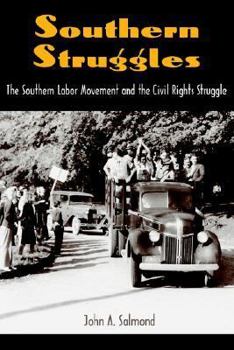Southern Struggles: The Southern Labor Movement and the Civil Rights Struggle
(Part of the New Perspectives on the History of the South Series)
"Salmond's synthetic and sympathetic rendering of southern labor and freedom struggles provides a damning indictment of the repression used against them, and offers a fresh view into movement history for new and old students of the South."--Michael Honey, Harry Bridges Endowed Chair of Labor Studies, University of Washington, Tacoma
Comparing two major 20th-century movements for reform, John Salmond explores parallels between the fight of white textile workers for economic justice and the pursuit of racial equality by black southerners. He argues that their separate efforts illustrate the dark underside of Southern history--the failure of class to override race in the struggle for political, industrial, and social democracy.
Salmond maintains that white workers in southern mills in the 1930s and 1940s shared common goals with black activists in the civil rights movement of the 1960s. He identifies similar leadership styles, sources of motivation, and strategies of protest. For both groups, he says, church leaders and religious imagery offered inspiration, and women achieved critical leadership roles, especially at local levels, that have been long ignored. Tragically, both movements were strongly opposed by vigilantism and organized community violence. "Those who challenged the social order did so at the daily risk of their lives," he writes. Whether white or black, those determined to bring about change faced equally determined resistance to change from the upwardly mobile white middle class.
Local law enforcement officials were often the common enemy of both union organizers and civil rights workers, as were the state court systems. Salmond describes three violent incidents in which lives were lost and no one was held accountable: the Marion, North Carolina, textile strike in 1929, when county deputies fired tear gas into a crowd and then shot workers as they fled, hitting most in the back; the Honea Path, South Carolina, mill strike in 1934, which gave state governors the opportunity for widespread use of the national guard to maintain public order; and, in 1968, the Orangeburg, South Carolina, shootings of unarmed African American students protesting the failure of a local merchant to conform to the 1964 Civil Rights Act.
Eventually, Salmond says, both union leaders and civil rights activists looked to national organizations, including the federal government, to help win their struggles. He evaluates the measure of their success, emphasizing points of continuity and highlighting their shared humanity, courage, and commitment.
John A. Salmond is professor emeritus of American history and former pro-vice chancellor at La Trobe University, Victoria, Australia.





